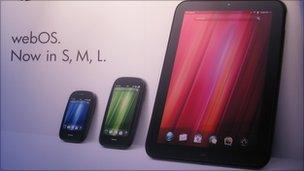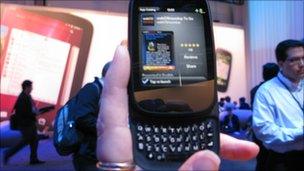Hewlett-Packard unveils Palm-powered tablets
- Published

HP is putting its the web operating system front and centre of new products
Hewlett-Packard (HP), the world's biggest technology company, is making a major play for the multi-billion dollar mobile market with a slew of products based on its own operating system.
At an event in San Francisco, the company announced two new phones and a long-awaited tablet computer.
HP's new TouchPad tablet will compete against Apple's iPad, Google's Android-powered machines and RIM's Playbook.
The TouchPad is based on the webOS operating system.
This was developed by Palm and bought by HP last year for $1.2bn (£745m).
HP is hoping its investment will pay dividends with tablet sales expected to soar to over 50 million in the coming year.
HP said the mobile connected devices market is currently worth $160bn dollars.
'Jumbo phones'
The Silicon Valley company that started life in a small garage is clearly betting big that products powered by its own operating system will give it a foothold in the sector and make it a force to be reckoned with.

The veer is billed by HP as an antidote to "jumbo phones"
"Our intention with webOS devices is to transform how people think, how they feel and how they connect," Todd Bradley, executive vice president of HP's personal systems group, told a room full of reporters, analysts and developers.
The two phones will also be powered by webOS. The Veer, which was billed as an alternative to "jumbo phones", is about the size of a credit card with a 2.6 inch screen and 8 gigabytes of storage.
Technology blogger Robert Scoble of Scoblizer.com told the BBC the Veer is "very much a second phone - cute, easy to carry and for going out at night."
The Pre3 smartphone has a 3.6-inch diagonal screen, slide-out keyboard, video calling capability and 16 or 32 gigabytes of storage.
There was no mention on how much the devices will cost.
The Veer will go on sale in the spring and the Pre3 in the summer. It will be joined by the TouchPad which will also hit shelves in the summer.
In addition to these new mobile-oriented products, HP ended the event by announcing plans to build laptop and desktop computers that rely on webOS. Printers, a cash cow for the company, are also expected to be driven by webOS.
So what does this mean for Microsoft and its Windows OS which dominates the PC market?
"It is important to stress that today HP is among a number of Microsoft manufacturing partners," said Charles Golvin with Forrester research.
"HP is unique now in that it owns a software platform they can add today as an addendum and tomorrow as a substitute for Windows, but that is not true for a host of others from Toshiba and Sony to Dell and Lenovo.
"But it does mean that, in the long term, Microsoft's ability to dictate the experience on PC's is going to be weakened for its vendors for the foreseeable future."
'Mobile messiah'
WebOS received rave reviews when it made its debut in 2009, but Palm lost momentum when it failed to get products to market quickly.
Wired Magazine said that when Palm first unveiled the operating system, "the new platform was supposed to be the next mobile messiah".
When HP bought Palm last year, a number of industry watchers had expected webOS devices to emerge shortly after.
That did not happen. So how real is the fear that HP is too far behind to gain any momentum at a time when analysts are predicting the iPad will snag over 30 million of this years expected 54 million tablet sales?
"What we have seen with HP's announcement and from Google and RIM is that no-one is ceding this market to Apple," Michael Gartenberg of research firm Gartner told the BBC.
"This family of products requires the financial clout of an HP behind them and shows exactly how high the stakes are in this game, whether you are talking smartphones or tablets.
"The question now is can they execute, can they get the marketing down, at what price point and can they persuade developers to offer compelling apps the way Apple has?"
'Developer mindshare'
Central to the success of the TouchPad, as with all mobile devices, is the application store.
Apple's iOS has over 300,000 apps while Android has more than 100,000. At last count, Palm had 5,400. Analysts have estimated that HP needs 30,000 to 50,000 if it hopes to compete.
There was no mention during the event about precise numbers, but Jeff Scott, founder of review site 148 Apps, said developers are key to the success of these products.
"It's all about developers," he says.
"HP have brought the hardware and have a fantastic OS, but getting developer mindshare, getting them to engage with the device and actually release apps, that is what is going to get consumers to part with their cash."
During the San Francisco event, HP outlined a number of partnerships it has forged to bring content to webOS devices, including a free Kindle e-reader app from Amazon and the chance to purchase subscriptions to magazines such as Sports Illustrated and People.
Increased competition
HP's announcement comes amid growing rumours that Apple will unveil an iPad 2 in the coming months.
The blogosphere reports that the second generation device will be thinner, lighter and come with a front facing camera like a number of competitors that have followed in its footsteps.
Apple has sold nearly 15 million iPads since the tablet computer hit store shelves last April.
Although Apple dominates the market at the moment, research firm IHS iSuppli estimates that by 2013, the iPad's market share will drop to less than 50% of the overall market.
Last week, Google unveiled its operating system Honeycomb, designed expressly for tablets.
"We would love to see another player in this two-horse race," said Andrew Eisner, director of content at consumer gadget site Retrevo.
"Android is not standing still and the iPad is due in the spring and there are other players coming in to make this a pretty competitive field."
Earlier this week, Dell said it plans to release a 10-inch tablet running on Microsoft's Windows 7 operating system.
Motorola's Xoom, running on Android, is expected to hit stores next week.
- Published28 January 2011
- Published21 October 2010
- Published5 January 2011